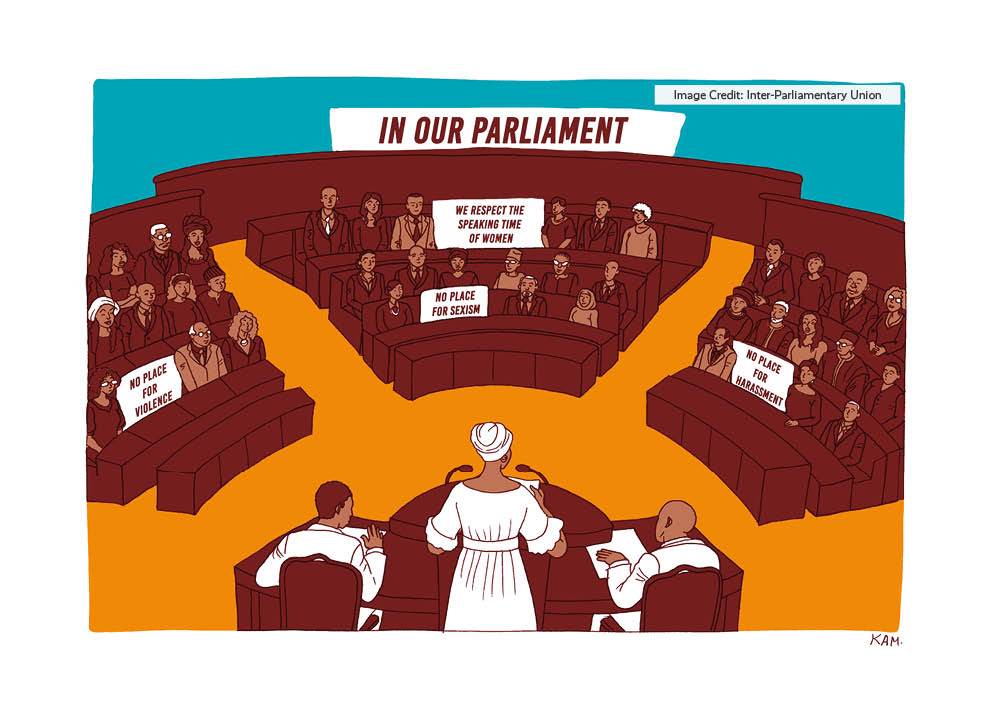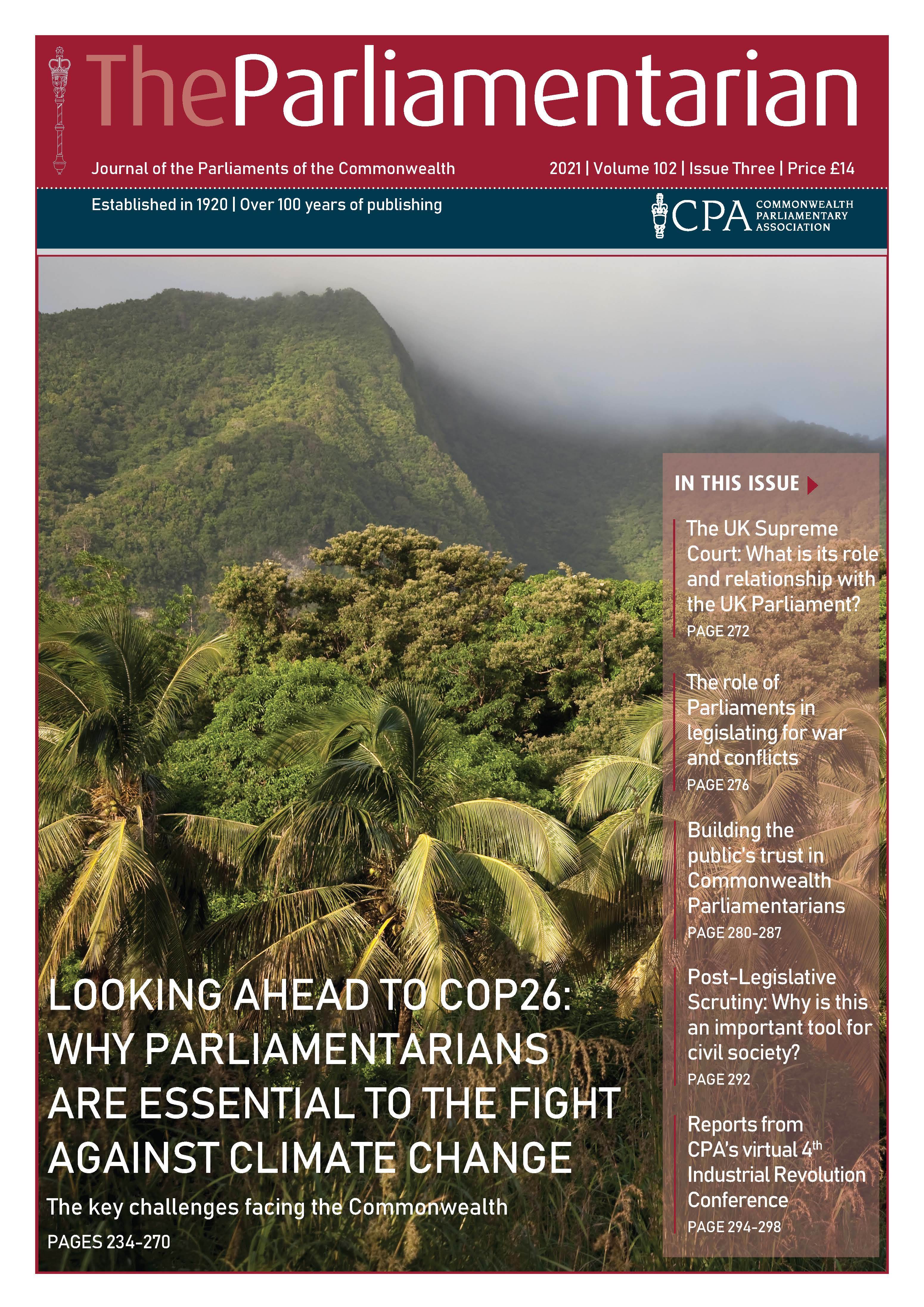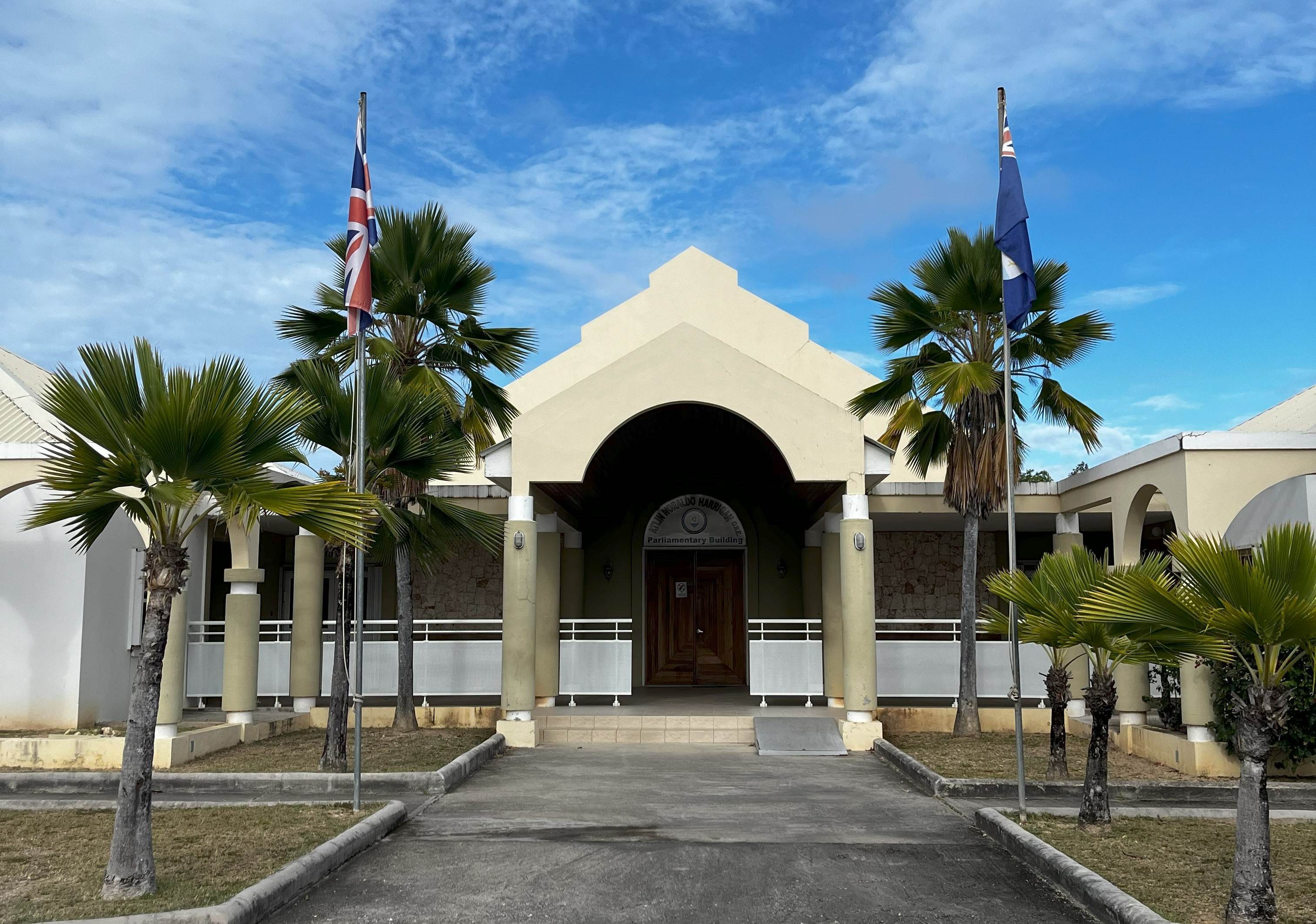The Parliamentarian is the quarterly Journal of Commonwealth Parliaments published by the Commonwealth Parliamentary Association (CPA) and features articles, news and legislative reports written by Members of Parliament, parliamentary staff and international experts across the Commonwealth about a wide range of global issues. Click here to download the latest issue.

Seychelles takes climate change fight seriously
This blog is part of the CPA’s blog series, ‘Climate change challenges for the Commonwealth'. The series was published as the COP26 conference takes place in Glasgow in November 2021. You can find all the articles in the series here.
The Deputy Speaker of the National Assembly of the Seychelles, Hon. Gervais Henrie MNA, focuses on one of the most pressing issues for the CPA Small Branches – climate change - as he reports on the Seychelles efforts in this area.
In May 2016, the former United Nations Secretary-General Ban Ki-moon called on the 5th National Assembly of Seychelles to support the UN’s effort in tackling three critical challenges: climate change, global sustainability and easing humanitarian suffering. The call did not go on deaf ears.
Following the election of the 6th cohort of the National Assembly of Seychelles in October 2016, the institution embarked on a series of projects showing its leadership in the use of renewable energy and energy efficiency technologies and adopting sustainable practices to showcase possibilities and hopefully inspire other Ministries, Departments and Agencies (MDAs) to do the same.
In 2020, the 7th cohort of the country’s legislative body, comprising of 26 directly elected and eight proportionately elected MNAs, took office. Members are well aware that Small Island Developing States (SIDS) such as the Seychelles are among the most vulnerable and greatly affected by the negative impacts of climate change.
Coastal erosion and massive flooding events are damaging critical coastal infrastructure such as airports, ports, desalination plants, and main roads, utility lines (for both electricity and water), houses, hotels and other buildings.
It should be noted that it is not only the state that must be held accountable for its contributions to climate change but also businesses based in each of the constituencies which have the responsibility to respect human rights and do no harm in the course of their activities.
The country’s water security is also under threat of sea level rise which can cause saltwater intrusion in the underground water storage systems affecting water quality and availability, according to the Seychelles National Climate Change Strategy published in 2009.
Seychelles’ massive Exclusive Economic Zone (EEZ) of about 1.37 million square kilometres of crystal-clear waters have suffered ocean acidification and coral bleaching, which have negatively impacted on the country’s natural beauty which tourists the world over come here for.
Its outer coralline islands now commonly experience coastal erosion, storm surges and tropical cyclones. During the 2006-07 South-West Indian Ocean cyclone season, the intense tropical cyclone Bondo severely damaged buildings and vegetation on Providence Atoll, which is approximately 710 kilometres from the capital Victoria, on Mahé island.
Ten years later, between 17th and 19th April, tropical cyclone Fantala, one of the most severe storms to ever hit the South-West Indian Ocean, twice passed near the Farquhar group, which is located 770 kilometres (478 miles) southwest of the capital.
The storm caused widespread damage to nearly all private and public buildings, including the destruction of important desalination facilities (only four cyclone-proof facilities on the island survived), while significantly impacting on the community and livelihoods in the archipelago. Cyclone Fantala also affected the Providence Atoll.
The massive storm that hit Farquhar caused US$4.5 million in damages and losses, according to a World Bank report following an assessment of the destruction caused by cyclone Fantala. The Government of Seychelles lost around US$500,000 in revenue which it would have collected as Value Added Tax (VAT) and business tax from Farquhar during the island’s gradual recovery.
Amid everything that is happening around us, the National Assembly of Seychelles starting with the 6th cohort came up with various proposed solutions to address the negative impacts of climate change through adaptation.
The National Assembly has improved its water management using a rainwater harvesting system for use in its daily operations, which has not only helped it to make considerable annual savings but also eased pressure on budgetary requirements.
A second project which is in line with the institution’s strategic priority of taking the lead in environmental sustainability and reduction of carbon footprint is the installation of a solar panel system on the rooftop of the National Assembly building at Ile du Port on Mahé.
The installation of the solar panel was made possible through a grant from the Indian Government in collaboration with the Public Utilities Corporation (PUC).
The 90kWp solar photovoltaic system produces about 126,000 kWh per year, which translates into annual savings of R616,169 (US$44,000) on the National Assembly’s electricity bill at present tariffs.
The National Assembly of Seychelles spends a significant proportion of its annual budget on generating electricity from diesel engines and since this system is connected to the grid, it is expected that there will be a large reduction in diesel consumption.
The Legislature has also banned the use of plastic bottles on its precinct, as part of a sweeping effort against plastic waste that despoils beaches and pollutes oceans.
Seychelles is proudly part of the international coalition of nations which is taking the important step to reduce littering and plastic pollution in our oceans and seas.
In April 2019, twenty-five tons of waste - including some 50,000 flip-flops - were collected on the Seychelles’ remote atoll of Aldabra, which is 1,150 km away from Mahé.
For five weeks, five volunteers from Queen's College, Oxford University and seven from Seychelles joined the Seychelles Islands Foundation (SIF) team, to help clean up the world's second largest coral reef, where a lot of man-made rubbish especially plastic waste has accumulated in recent years.
The National Assembly of the Seychelles was the first state institution to set this new and ambitious standard, paving the way for the rest of the MDAs.
Although Seychelles still remains an insignificant emitter of greenhouse gases (GHGs), its level of susceptibility to the negative impacts of climate change will keep increasing over the years as the impacts become more severe. The country emits less than 0.003% of global GHGs, an insignificant amount globally but an average of 5.38 tons of Co2 is released per person, and this is growing annually.
An increase in the average global temperature of 2 degrees Celsius will be catastrophic for Seychelles given that over 90% of the critical infrastructures are located along the shoreline.
Members of the National Assembly are mindful that because of the impacts of climate change on human rights, it must effectively address climate change in order to honour their Constitutional commitment to respect, protect, promote and improve human rights standards for all.
Seychelles has come a very long way since the Rio Earth Summit in 1992 with various achievements made to date in combatting climate change. It was the 16th country to ratify the Paris Agreement on Climate Change and has since taken the issue of climate change seriously.
As a Legislature, we are aware of the importance of political will in order to not only mitigate the effects but also in finding sustainable solutions to the issues that have already become a challenge. This is why, since the former UN Secretary-General Ban Ki-moon’s call, the National Assembly has remained determined to be a key institution that is leading in sustainably reducing its environmental impact by its current ongoing green campaign.
“I count on Seychelles to engage in these important events. During the years of discussion, one thing has become very clear to me. Small states have big ideas and big political will. Your experiences, commitment and insights have been invaluable” the former UN Secretary-General told the Seychellois Legislators five years ago. He stressed: “When you are united, small states can change the world.”
Ultimately the power to mitigate and adapt to climate change lies with the public, but the National Assembly like other Parliaments around the world, plays an essential role in representing short and long-term interests, leading the public in change, promoting green policies and holding the Executive to account.
This blog post is an extract from a longer article in The Parliamentarian (2021 Issue One) - to read the full article please click here.
This blog is part of the CPA’s blog series, ‘Climate change challenges for the Commonwealth'. The series was published as the COP26 conference takes place in Glasgow in November 2021. You can find all the articles in the series here.




